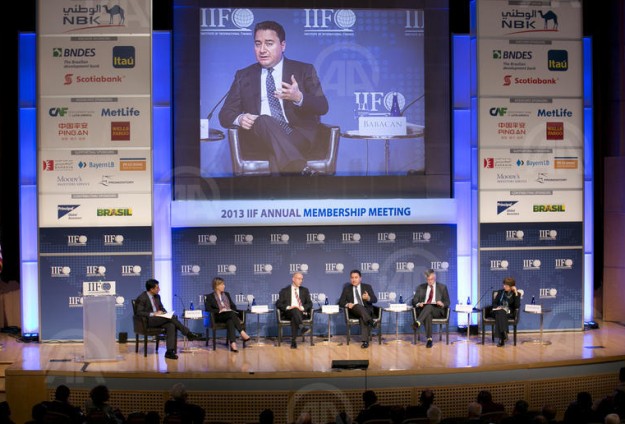As global economies continues to emerge from 2008’s economic crisis, major international forums will play a significant role in the recovery effort.
 Speaking at the Institute of International Finance’s 2013 annual membership meeting Saturday, Ali Babacan, the Turkish deputy prime minister for economy, emphasized the representativeness of the G20.
Speaking at the Institute of International Finance’s 2013 annual membership meeting Saturday, Ali Babacan, the Turkish deputy prime minister for economy, emphasized the representativeness of the G20.
“What is important about the G20, in my view, is the representation power, representation in terms of advanced economies and developing, representation power in terms of geography. And this representation power gives G20 a very important level of political legitimacy. The wider the representation base, the stronger the legitimacy,” said Babacan.
He added: “So it is a good setting to build consensus, but building consensus also means compromise. And that’s why, for some subjects, getting to consensus is not easy. But the value of G20, I think, has been quite evident, because it was the only international platform during the time of the crisis, which brought countries together for policy coordination, for cooperation.”
This is particularly evident in light of other less-inclusive organizations, said the deputy prime minister.
“G7 is still there, but look at the influence of G7, what G7 has been deciding on, versus the influence of G20 over the last five, six years. It’s so natural that this huge representation power and hence political legitimacy is going to be important to follow,” he said.
Such venues will be increasingly valuable as national economies become progressively intertwined, he said.
“We are, right now, in a very, very interconnected world. So whatever happens in any major economies in the world, whether developed, or developing, immediately affects the other. I think just simply having the leaders sitting around the table once a year right now, it was sometimes more frequent especially during the depth of the crisis, twice, thrice we observed summits. It is important for everybody to feel that nobody is alone. And whatever one country does, for its own economy, does have effects for other economies as well. So I think the G20 also is strengthening a culture where countries, when they drive economic policies, financial policies, whatever they do, they know that there are others in this world, and whatever they do will have impact on others,” he said.
The deputy premier further emphasized the importance of the person-to-person meetings that the G20 affords.
“That human touch which brings ministers, deputies, sherpas together quite frequently, has also very, very important positive outcomes regardless of what the communiqué says, regardless of what the decisions are made. That the feeling of we are living together in this world, and whatever we do is also important for others. And impact on others will come and impact them back. So this mutual feedback mechanism is something which is I think going to be more and more important, and G20 is not too small to have any kind of representation issue, or its not too large so that you cannot even discuss a thing,” Babacan said.
– Turkey’s upcoming G20 presidency to emphasize outreach
As the Turkish government prepares to assume the presidency of the G20 in 2015, a central goal of Turkey’s tenure will be to further expand the organization’s scope.
“We have already have started to make preparations for our term presidency, and we, of course, are going to continue with the mainstream subjects. But then we are going to be concentrating also on outreach activities of G20 — how to make G20 more relevant to the least developed countries, for example, how to make G20 demonstrate a stronger stance for global issues, whether it’s about humanitarian issues or environmental issues,” said Babacan.
Anatolia News Agency















